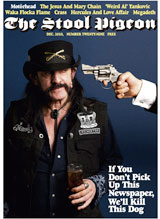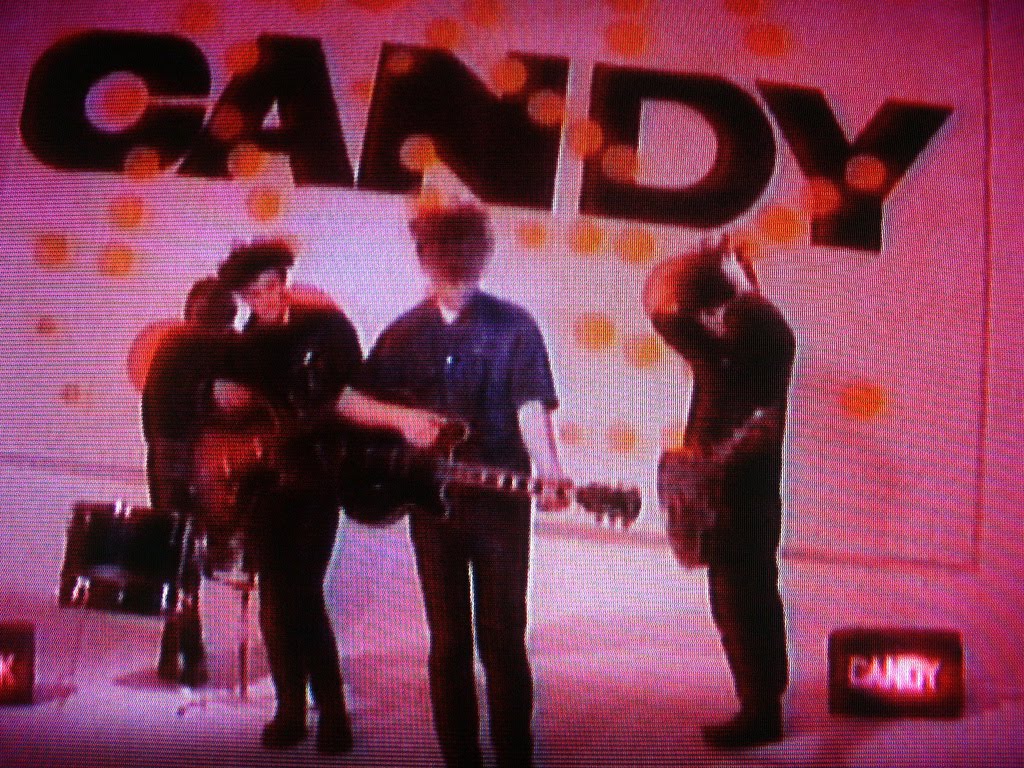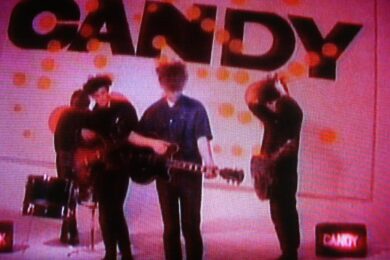In Julian Temple’s documentary on the Sex Pistols, The Filth And The Fury, the opening scenes are dedicated to portraying the failures of the Harold Wilson and the James Callaghan Labour administrations. When set against a backdrop of three-day weeks, the rubbish going uncollected across the UK, bodies piling up outside graveyards in Liverpool, power shortages and mass unemployment – all shot on austere, grainy film stock, it’s perhaps understandable that some people claim the Pistols “had” to happen.
It’s harder to pin spurious societal causes onto East Kilbride’s Jesus And Mary Chain, even though they were the true inheritors to the Pistols’ crown in the 1980s. It would probably be fairer to say that it was the mainstream musical wasteland midway through that decade that necessitated their existence. The revolutions promised by post punk and synth pop had given way to a period of commercial blandness, the like of which hasn’t been seen since.
It turns out it was the Sex Pistols themselves who were the primary influence on the group. Much has been made of the energizing effect Lydon and the rest had (“the force of a hand-grenade tossed into an arrangement of gladioli”, as Jon Savage described it) on young musicians in Manchester in the late 1970s. But two other teens switched on were the Scottish brothers Jim and William Reid; it’s just that, unlike Joy Division and The Fall, they chose to sit round on the dole, daydreaming about success rather than going for it. Jim Reid is talking to us today because of the release of Upside Down – The Best Of The Jesus And Mary Chain, an anthology (which although doesn’t contain ‘Snakedriver’ or ‘Surfin’ USA’) that captures the essence of their renegade, rock & roll in a way the hastily cobbled together 21 Singles failed to do in 2002.
He admits that they were only spurred into action some seven years after punk exploded in 1983 by the realisation that it was ‘now or never’: “Punk happened and that was when it seriously dawned on us that we could do it to. But we really are quite lazy people. [laughs] It was too comfortable just sitting around and listening to music. And the years start to pass. You take stock after a while and think, ‘Where is this going?’ And you realise that if you don’t do it soon then it isn’t going to happen for you… that someone else will come along and do all the things that you’ve talked about.”
Giving up on the nearest big city (Glasgow) after a few weeks of failing to get gigs, they moved down to London where an early chance encounter with Bobby Gillespie (who would later join as drummer, alongside Douglas Hart on bass) proved invaluable. Jim says: “We gave one of our demo tapes to a guy to get a gig in a club and he didn’t like it. There was a Syd Barrett compilation on the other side of the tape. This guy said to Bobby, ‘Here, you like Syd Barrett… here’s a tape for you.’ And as luck would have it, he listened to our demo and loved it. He rang and said he had a mate called Alan McGee who would give us a gig. When we phoned McGee up, he was a bit like, ‘Don’t bother me.’ I got the impression that Bobby was doing this kind of thing to him all the time! But he came to see us doing a soundcheck one day and it blew him away. We had a row right in front of him and and then we did the soundcheck which was so unmusical and angry that he came charging over, ranting and raving about five album deals. Which was weird because we thought we’d blown our chances with him… but looking back, he must have thought we were nutters.”
Jim won’t give that much credit to the Creation boss, saying that they already knew what they wanted to sound like (Velvet Underground, Hank Williams, Bo Diddley, Beach Boys, Dick Dale, Phil Spector) and what they wanted to look like (Bob Dylan, The Beatles in Hamburg, Johnny Cash). In fact he said the first thing the band did with their pooled earnings from their debut gigs was to visit the leather trouser shop to get fitted up. But he admits that the ambitious McGee did see himself as their Malcolm Mclaren and played a part in hyping them up as the band that would cause riots wherever they went. This was a fairly cool myth building exercise at first, until it became a self-fulfiling prophecy at Camden Electric Ballroom and North London Poly, in 1985. He explains: “It seriously wouldn’t have surprised me if someone had have been killed at one of those gigs. We wouldn’t go on stage until we were ‘in the mood’. We’d be siting in the dressing room getting tanked up and the promoter would come in like a nervous wreck going, ‘For fuck’s sake, you were supposed to be on half an hour ago.’ Then there would be this sound like Thump, thump, thump. And we’d be like, ‘What the fuck is that?’ After a while someone would come in and say, ‘You’d better lock the door. The audience are coming to get you.’ And we’d be like, ‘Oh fuck!’ In North London Poly, it actually happened when we were on stage and everyone went nuts. They were trying to drag us into the crowd. The PA got pulled down and all of the rest of it. You just think, ‘This isn’t funny anymore.’”
They distanced themselves from the violence and McGee not long afterwards. Their original sound, which had been anchored by Bobby Gillespie’s double tom drumming and then a drum machine, was swapped for a more classicist direction. This included live drums and a gradual stripping away of the feedback to reveal a pair of very capable songwriters in Jim and William.
But if they produced music that was gradually becoming more harmonious, then their relationship was slowly heading in the other direction. It was an irony that Creation records’ first hit act (albeit for one single only) suffered from exactly the same problem as their biggest act, Oasis: a pair of continually rowing brothers.
When we put it to Jim that outsiders could be forgiven for not realising that they were actually related given the gulf between them, he replies: “Well, that’s how it is now. It wasn’t always like that. Back at the start of the band, people used to think of us as spooky twins almost. We finished each others sentences… we agreed on almost everything. We argued but it was always constructive. We argued over music and the band. In the beginning we were pulling in the same direction. And I don’t know how it happened but during the course of the band’s progress bit by bit it started to disintegrate. It seemed that we were pulling in different directions but we weren’t really: we still wanted the same things… it’s just that something had changed.”
Asked if it’s too much for brothers to be in successful rock groups together, he says: “I think it’s hard to be in a band with anyone but if you’re not brothers then you can just go your separate ways. You can try it out, scream at each other, say things that cannot be taken back and do things that mean that the situation can no longer exist and then you’ll no longer see each other again. But when it’s your brother, you still say all of those things, you still do all of those things but because you’re brothers you come back. The Mary Chain would have probably broken up in 1985 if we hadn’t been brothers. It was that that kept us going.”
They would never be without trouble though. As soon as they’d dealt with rioting and the fraternal feuds, there were the drugs, the fighting, the radio and TV bans, the tabloid scandals, the alcoholism, the addiction. It was perhaps a miracle that The Jesus And Mary Chain still went on to become massive around the world. It was their more traditionally rock & roll sound that endeared them to the Americans but they also had a massive fan base in Europe and Japan. Most places bar Britain, to be honest. He sighs: “I’m not really sure why but we really seemed to piss a lot of people off in this country. We were excluded from what became the indie scene in this country because we were on a major label. But abroad it didn’t seem to matter, there was a lot more of a reverential attitude towards the Mary Chain.”
But for those of us who were there at the time, there will never be another band as important as JaMC. They kick started alternative rock in late 80s UK, paving the way for the likes of Loop, My Bloody Valentine, Spacemen 3 and Ride. And over the pond their influence could be felt on The Pixies, Sugar, Ultra Vivid Scene and Dinosaur Junior. And for a short time at least – between the release of their debut Psychocandy and follow up Darklands – they actually were famous in this country. Media-wise, everyone in the UK kept a nervous eye trained on them. Jim allows himself a rare chuckle when he remembers one of the more unusual things that befell the group during this period: “We made the cover of Smash Hits. We got it at the expense of Spandau Ballet and they pulled their feature. They were outraged because the spotty, noisy Mary Chain got the cover. And as far as I’m concerned that was the peak of our career.”

The latest issue of The Stool Pigeon is out in stores now and features interviews with Motorhead, Megadeth, Wacka Flocka Flame, Hercules And Love Affair and ‘Weird Al’ Yankovich. For a full list of stockits, see here.
And if you see a giant ginger man wearing a Stool Pigeon uniform delivering big bundles of the paper in London, then that’s Phil the Editor. Make that man a cup of coffee! Milk and one sugar! Real caffeine talk!



